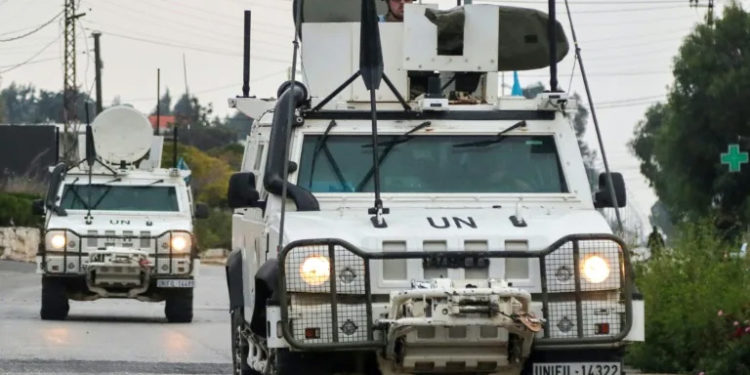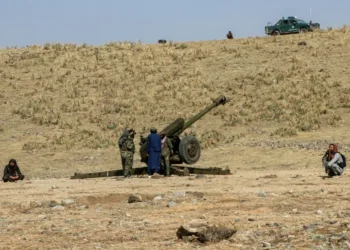As the holy day got under way Friday from sundown, Israel faced diplomatic backlash over what it acknowledged was a “hit” earlier in the day on a United Nations peacekeeping position in Lebanon.
Two Sri Lankan peacekeepers were hurt in the second such incident in two days, the UNIFIL mission said Friday.
The military said Israeli soldiers had responded with fire to “an immediate threat” around 50 metres (yards) from the UNIFIL post.
As Israel faced a chorus of condemnation from UN chief Antonio Guterres and Western allies, the military pledged to carry out a “thorough review”.
Lebanese militant group Hezbollah meanwhile warned Israelis to stay away from Israeli army sites in residential areas in the north of the country, alleging the military “uses the homes” of locals and has military bases in residential neighbourhoods.
Hezbollah has repeatedly announced it has fired rockets at areas in northern Israel, where sirens blared in multiple locations early Saturday.
– ‘Outrage’ –
The UNIFIL peacekeepers have found themselves on the frontline of the Israel-Hezbollah war, which has killed more than 1,200 people in Lebanon, according to an AFP tally of Lebanese health ministry figures.
The latest incident came a day after two Indonesian soldiers were hurt when, according to UNIFIL, tank fire hit a watchtower.
Sean Clancy, the Irish military’s chief of staff, said he did not believe Israel’s explanation of Friday’s incident.
“So from a military perspective, this is not an accidental act,” said Clancy, whose country has troops in UNIFIL.
Guterres condemned the firing as “intolerable” and “a violation of international humanitarian law,” while the British government said it was “appalled” by reports of the wounded.
US President Joe Biden said Friday he was “absolutely” asking Israel to stop firing at UN peacekeepers, while the French, Spanish and Italian leaders issued a joint statement expressing “outrage.”
French President Emmanuel Macron renewed his call for an end to exports of weapons used by Israel in Gaza and Lebanon, while saying the UN peacekeepers had been “deliberately targeted”.
The incidents came more than two weeks into Israel’s war with Iran-backed Hezbollah in Lebanon, which has seen Israeli warplanes conduct extensive strikes since September 23 on the militants’ strongholds, with multiple civilian areas hit, and ground troops deployed across the border.
– ‘Immediate ceasefire’ –
Israeli and Hezbollah forces fought along the border on Friday, with Israeli air strikes reported in the south and east of Lebanon.
It marked a tense start to Yom Kippur. From sundown on Friday until nightfall on Saturday, Israeli markets are closed, flights stopped and public transport halted as observant Jews fast and pray on the Day of Atonement.
Diplomatic efforts to negotiate an end to the fighting in Lebanon and Gaza have so far failed, but Lebanese Prime Minister Najib Mikati said his government would ask the UN Security Council to issue a new resolution calling for a “full and immediate ceasefire”.
Leaders from nine European countries around the Mediterranean Sea on Friday also called for an end to fighting in Lebanon, as well as Gaza.
Mikati said that only the Lebanese military and peacekeepers should be deployed in the south of the country — the essence of existing Security Council Resolution 1701 — and “Hezbollah is in agreement on this issue”.
US special envoy Amos Hochstein said the United States was working “non-stop” towards a ceasefire.
“We want the whole conflict to end,” he told Lebanese television channel LBC from Washington.
Lebanon’s military said an Israeli strike on one of its positions in south Lebanon killed two of its soldiers on Friday.
Hezbollah is heavily armed and controls large swathes of Lebanon, and successive Lebanese governments have failed to subdue it.
The movement also fought Israeli troops during Israel’s last invasion in 2006.
– Beirut attack –
In Beirut, residents of a central area of the capital targeted by twin Israeli air strikes on Thursday night salvaged their possessions and cleared rubble from the devastated streets.
“There are a lot of families living here,” said Bilal Othman, who explained that many people had sought shelter there from southern Beirut, a Hezbollah stronghold, which has been pummelled by Israeli raids since last month.
“Do they want to tell us there is no safe place left in this country?” he said.
The Israeli strikes apparently targeted Hezbollah’s security chief Wafiq Safa, a source close to Hezbollah told AFP.
Lebanon’s health ministry said the strikes killed 22 people and wounded more than 100.
Safa was close to Hezbollah’s leader Hassan Nasrallah, who was killed in an Israeli strike on south Beirut last month.
– Children in Gaza –
Hezbollah began firing on Israel in support of its Palestinian ally Hamas, following the October 7, 2023 attack on Israel which resulted in the deaths of 1,206 people, mostly civilians, according to an AFP tally based on official Israeli figures, which includes hostages killed in captivity.
Israel’s military campaign has wrought devastation on Gaza and, according to data from the health ministry in the Hamas-run territory, killed 42,126 people, mostly civilians.
Late Friday, Gaza’s civil defence agency reported 30 people killed in Israeli strikes on Jabalia, north Gaza.
An AFP journalist in Gaza reported heavy artillery shelling, explosions and gunfire Saturday further south in Gaza City’s Zeitoun neighbourhood.
The co-head of a Japanese atomic bomb survivors’ group awarded the Nobel Peace Prize said the situation for children in Gaza reminded him of the plight of survivors after World War II.
“It’s like in Japan 80 years ago,” Toshiyuki Mimaki said in Tokyo.
AFP




















